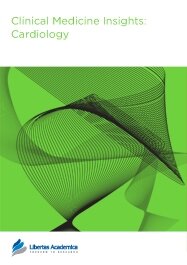

Publication Date: 31 Oct 2012
Type: Original Research
Journal: Clinical Medicine Insights: Cardiology
Citation: Clinical Medicine Insights: Cardiology 2012:6 145-152
doi: 10.4137/CMC.S10553

Background: Clinical studies suggest that testosterone (T) plays an important role in the male predominance of the clinical manifestations of the Brugada syndrome (BS). However, no statistically significant correlations have been observed between T levels and electrocardiogram (ECG) parameters in the BS patients. We investigated whether the hormonal pattern and the variation within CAG repeat polymorphism in exon 1 of the androgen receptor (AR) gene, affecting androgen sensitivity, are associated with the Brugada ECG phenotype in males.
Methods and Results: 16 male patients with BS (mean age 45.06 ± 11.3 years) were studied. 12-lead ECG was recorded. Blood levels of follicle-stimulating hormone, luteinizing hormone, prolactin, testosterone, free-T, dihydrotestosterone, 17--estradiol, estrone, 3-alpha-androstanediol-glucuronide, delta-4-androstenedione, dehydroepiandrosterone sulphate, progesterone, 17-hydroxyprogesterone, and sex hormone binding globulin were assayed. Genotyping of CAG repeats on DNA extracted from leukocytes was carried out. No relationship was found between hormone values and ECG parameters of BS. BS patients showed the CAG length normally recognized in the human polymorphism range and the number of CAG repeats did not correlate with the ECG pattern of BS.
Conclusions: The AR CAG repeat length does not correlate with the ECG features of the patients affected by BS. The search for genes downstream AR activation as possibly responsible for the increased risk of spontaneous arrhythmias in BS males after puberty is warranted.
PDF (736.23 KB PDF FORMAT)
RIS citation (ENDNOTE, REFERENCE MANAGER, PROCITE, REFWORKS)
BibTex citation (BIBDESK, LATEX)
XML
PMC HTML

I am impressed by the efficiency at each step of submission in the journal. Based on the first-hand experience, I am confident that this journal will have a great future, and the impact factor will rise rapidly.

All authors are surveyed after their articles are published. Authors are asked to rate their experience in a variety of areas, and their responses help us to monitor our performance. Presented here are their responses in some key areas. No 'poor' or 'very poor' responses were received; these are represented in the 'other' category.See Our Results
Copyright © 2013 Libertas Academica Ltd (except open access articles and accompanying metadata and supplementary files.)
Facebook Google+ Twitter
Pinterest Tumblr YouTube